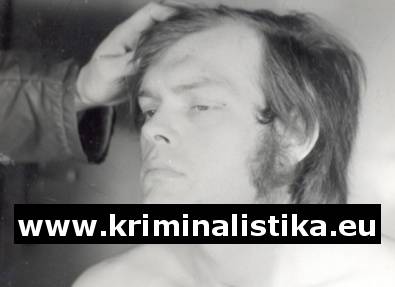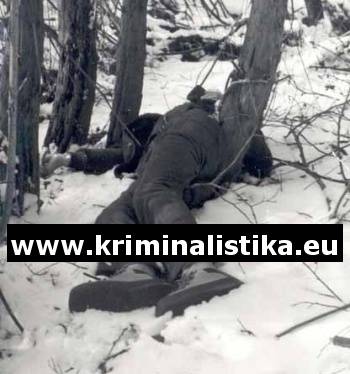František Tégler
Born on March 29th, 1952 (Slovakia, Dolný Kubín) - executed on September 25th, 1980, Bratislava

František Tégler was one of seven, he left basic school after finishing the fifth grade and became a taylor. Before finding a job in Pucov, he had been an assistant driver in ČSAD Dolný Kubín for two years. The sheep-man was a kind of man who hardly ingratiate himself with his neighbours. He was an illiberal, short-tempered brawler. When he was seventeen, he abused and butchered a little boy.
It happened in the woods in Stráň near Dolný Kubín in a May evening, 1968. He whiles the boy into the woods, strips him down and rapes him. He causes the boy a serious injury of his anal canal. The boy is still alive when he hangs him. A youthfull Tégler is sentences to a seven-year imprisonment only. When being in prison, he is sentenced to nine more months for hurting a co-prisoner and obstructing an authoritative decision.

On March 10th, 1979, Tégler sets out on his road to hell. He suggets his fellows to make up a purse and buy a bottle of vodka. He is the first to make up his purse. He also remembers buying a bottle of vodka to an engineer for his birthday. That man is on holiday at that time and thus he decides to buy the bottle from the engineer's secretary. A fellow of Tégler's, Ján (= Jano, kindly), says he does not have any "small money" on him and pulls out a sheaf of five-hundred notes from his pocket. Tégler becomes interested.
"Jano, why do you have so much money on you?", the fellows ask. "I need it for building materials", Jano answers not knowing he will never finish his building. A not-quick-witted Tégler suddenly makes up a plan how to take a possession of his fellow's money: he will take an axe from the cloak-room and hit Jano's head. Jano will fall unconsciousness and he will steal his money. The gate-keeper Ondrej promises to stay on duty till the morning. Tégler watches for Ján going home. It is a quarter past seven, it is getting dark and Ján sets out on his way home. He lives in a village called Pokrývač. It is not a long way to his house when Tégler approaches him from behind and hits his head with the axe. Tégler is not lucky enough as Ján howls with pain and runs to the village. Tégler catches him, prostrates him and they start to fight. Ján recognizes him: "Fero, what does that mean?" Tégler has to get rid of the unwanted witness and thus he starts hitting Ján's head with the axe until Ján is dead. When Ján does not move any more, Tégler seeks his pockets through. He finds just Ján's personal documents which he throughs away. But he manages to find 7.000 CZK in a pocket of his throusers. He returns to work then. He returns the axe to an appropriate place, the purse is burnt in the cloak-room stove. He stays at work pretending nothing has happened. He spends 1.200 CZK during a day, the rest of the stolen money is hidden in Tégler's bed.
Ján has not returned from work and his wife starts to worry. He has never come late home. As luck would have it, when looking for her husband, she meets Tégler not far from the village. She asks him whether he knows where her husband is. "It's none of my business," Tégler answers. She goes to her husband's work where she learns that he went home last night. Now she knows something bad has happened to him. She asks Ján's fellows to help her to look for her husband. They find Ján's cap, his bag, they find Ján's dead body in the end. Tégler's fellows know Tégler very well, they know what kind of man he is and thus he becomes the very first suspected.
František Tégler is arrested the very next day. A blood-stained axe is found during the house search in Tégler's house. 5.820 CZK in cash is found there too. Tégler pleads guilty. "The money I earn is not enough for me. I have to borrow money from my fellows. I have to support my mother, as she has to pay lots of her loans. I did not want to murder Ján. I just wanted to stun and rob him. But he recognized me and thus I decided to murder him," Tégler says during the police investigations. "I have has stolen "just" 6.000 CZK, not 7.000 CZK," Tégler claims. Later, he claims he has murdered Ján just because he was angry with Ján as he was strong enough to be robbed.
Ján's wife describes the relationship between her husband and Tégler: They were friends. He had visited their house three times. Ján loved him and he described him as a kind and quiet man. They thought him to be a decent chap. According to Viera G., another witness in that case, Tégler is known to be a teetotaller. Why did he want his fellows to make up their purses to buy a bottle of vodka? Why did he party them? They find one more interesting thing. When the murdered Ján spoke about his money in cash, he spoke about seven five-hundred bank notes. Tégler claims Ján had 7.000 CZK on him. Sharp...!

Ján Kaco died of a serious head injuries, circulatory insufficiency and a multiple fracture of the base of the skull caused by a murderous attack leading to an immediate death.
The medical experts prove Tégler's character to be rather strange - some personality trails of his, for example the system of values, have not developed. But he is not a psychopat despite the fact the very first medical report (worked out after his first murder) says so. He was only a sixteen-year old boy and his personality had not been fully developed at that time. His IQ is slightly above the average. Tégler has not been proved to be either alcohol or drug addict. His crimes are not psychopathologically motivated. The experts claim that Tégler does not suffer from any kind of mental disorders. When committing his crime, he knew what he was doing and he could fully control his behaviour.
Having murdered a little boy several years before and murdering another man at that time make Tégler an extra dangerous habitual offender. The medical experts come to the conclusion that neither an imprisonment nor a compulsory treatment can make him a full-valued member of the society again. Tégler does not enjoy a good reputation in his neighbourhood. He is said to be a misanthrope and a dangerous man. He would be a troublemaker even as a young boy. "A dumb dog," his employer says. He is not able to say more about him. František Tégler is sentenced to death by the Regional Court. He does not appeal from the judgement. He is executed on September 25th, 1980.
The text written in Slovak and the photographs sent to the Museum of Crime by Košice SlovakiaTranslated by inspector WO Pavel Vršovský, M. A.